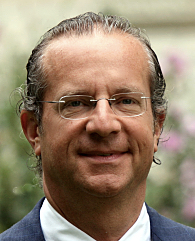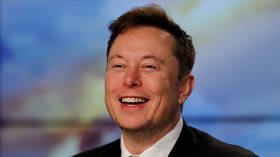I never thought I’d agree with Musk, but he’s right Tesla is in a huge BUBBLE... & St. Elon’s playing investors like a fiddle
In 40 years on Wall St, I’ve never known a CEO to publicly say its firm’s share price is too high. But Tesla's story shows how poor regulation, social-media hype and misallocation of capital causes vastly overinflated valuations.
In January 2020, CNBC had long-time Tesla bull, Catherine Wood, on as a guest, and she told viewers that she was forecasting that Tesla shares would surge to $6,000 within five years. The following month, Tesla shares defined “irrational exuberance” rising to $968.99 a share, up over 106 percent since the start of the year, and sending its market capitalization approaching $200 billion.
Tesla shares were the talk of social media, and every millennial investor was clamouring to become the next Tesla millionaire. It was the new MMC – the millennial millionaires club. The company was even one of the most popular purchases on the fractional share purchase website Robin Hood. Who wants to be a Tesla billionaire? After all, trading is simple, right?
Also on rt.com Elon Musk comes clean as the Bond villain that he isTesla’s valuation is divorced from economic reality and has been for a long time. During my Wall Street career, I have never seen a bigger and more outrageous bubble. In the future, Tesla will become a Harvard Business school case study highlighting how a lack of regulation, moral hazard, social-media hype and misallocation of capital inflates bubble-like valuations.
And the fact that over 30 top executives have left Tesla since 2018, including chief financial officers and almost the entire finance and legal departments, means I might not be the only one seeing problems with the company.
Volkswagen AG has a market cap of $80 billion and worldwide sales of $279 billion. VW sold nearly 11 million vehicles in 2019, the most by one manufacturer in the world. By comparison, Tesla has sold 880,933 cars, generating a total of $70.4 billion in revenue, in the company’s entire existence since 2016.
And yet, Elon Musk’s Tesla had a market capitalization almost double that of Volkswagen – more than $150 billion – after announcing its earnings for the first quarter of 2020 after the close. Tesla's stock surged to nearly $900, following the announcement and Elon Musk’s press conference.
Musk is one of the most colourful and outspoken chief executives in existence and has a loyal fanbase that almost resembles a cult. These fans troll anyone who ever dares to question anything St. Elon says. St. Elon condescendingly admonishes and demeans Wall Street analysts as well as anyone who dares to ask critical questions regarding Tesla's accounting and the overall financial viability of Tesla.
During Musk’s May 2018 Tesla first-quarter earnings call, Antonio Sacconaghi, an analyst at Wall Street firm Sanford C. Bernstein and Co., asked Musk about Tesla's future capital requirements. Musk failed to answer, snapping, “Excuse me. Next. Boring bonehead questions are not cool.”
Joe Spak, an analyst at Royal Bank of Canada Capital Markets, then asked Musk about reservations around the firm’s Model 3 car. To which Musk responded by saying, “These questions are so dry. They're killing me.”
Musk next turned to a YouTube star, a small retail investor who hurled St. Elon a fat meatball pitch to hit out of the park. Of course, none of the Tesla fanboys’ questions had anything to do with Tesla's financial health. Tesla's stock tumbled nine percent after that conference call.
When many were questioning the financial viability of Tesla, Musk tweeted bizarrely: “Tesla Goes Bankrupt Palo Alto, California, April 1, 2018 -- Despite intense efforts to raise money, including a last-ditch mass sale of Easter Eggs, we are sad to report that Tesla has gone completely and totally bankrupt. So bankrupt, you can't believe it.”
In August 2018, when a Tesla bankruptcy was not out of the question, Musk tweeted:
Am considering taking Tesla private at $420. Funding secured.
— Elon Musk (@elonmusk) August 7, 2018
This tweet resulted in a fraud investigation by the US Securities and Exchange Commission (SEC) that resulted in a 2018 SEC finding that “Musk had no funding in place.” Musk's lawyers arranged a settlement that required Musk to pay a $20 million fine and to step down as chairman of Tesla for a period of at least three years and that Tesla must monitor and approve all of Musk's future statements before they are released on all mediums. Additionally, Tesla was separately fined $20 million and required to appoint two independent directors to the board.
Tesla's latest 10-Q, filed with the SEC on April 30, 2020, was signed by Elon Musk – Chief Executive Officer. Elon Musk remains on Tesla's board and is still running the company.
We can never rely upon regulators and serious questions continue to swirl in the markets as professionals wonder what is going on with Tesla and its finances. When reporting earnings for Tesla's third quarter of 2019, it posted Generally Accepted Accounting Principles (GAAP) net income of $143 million, while the non-GAAP number was $342 million. The non-GAAP earnings exclude stock-based compensation.
Famed investor Warren Buffett would be very critical of Tesla's questionable accounting treatment of stock-based compensation. Buffett has stated that “managements sometimes assert that their company's stock-based compensation shouldn't be counted as an expense…. What else could it be – a gift from shareholders?”
In Tesla's first-quarter earnings of 2020 conference call, Musk cited his confidence in seeing a 40 percent compound annual growth rate over the next five to ten years. Will St. Elon deliver on this by having fairies selling pixie dust to leprechauns? Or Model 3s to Eskimos? Is everything well at Tesla with St. Elon at the wheel?
Then we have Musk's most recent tweets about Tesla’s share price being too high, which knocked $14 billion off his company’s share price in one day, and another that he’s selling all his possessions.
I’m all for him agreeing with my long-held belief his company is way overvalued, but you don’t often see CEOs publicly dissing their own shares like that. In fact, in 40 years, I’ve never seen it once.
It not only makes me wonder what the hell is going on inside Musk’s head (perhaps he’s planning some Into The Wild-style adventure?), but also, more importantly, what is going on with our apparently toothless regulators:
Tesla stock price is too high imo
— Elon Musk (@elonmusk) May 1, 2020
I am selling almost all physical possessions. Will own no house.
— Elon Musk (@elonmusk) May 1, 2020
My gf @Grimezsz is mad at me
— Elon Musk (@elonmusk) May 1, 2020
When asked by The Wall Street Journal if anyone at Tesla vetted these tweets, Musk replied, "No." It seems Chief Executive Officer Musk, aka St Strange of Palo Alto, has no intention of complying with the judge's order.
Welcome to the oligarchy.
Like this story? Share it with a friend!
The statements, views and opinions expressed in this column are solely those of the author and do not necessarily represent those of RT.















